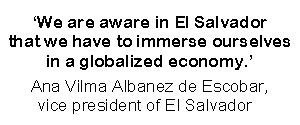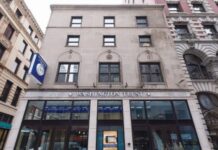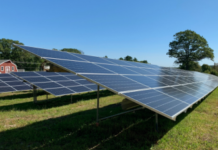A number of factors drew The Moore Co. Textile Group to invest in a 250-employee manufacturing plant in El Salvador a year ago this month.
One was El Salvador’s dollarized economy, said Goran Elovsson, president of the Westerly-based narrow elastic textile maker. Since El Salvador adopted the U.S. dollar as its currency in 2001, the country’s inflation has stabilized and its interest rates have dropped.
In addition, El Salvador’s telecommunications infrastructure and transportation system are better than those of other countries in the region, Elovsson said. And there were the benefits of the Dominican Republic-Central America Free Trade Agreement (DR-CAFTA).
But Elovsson was also impressed by El Salvador’s business-friendly environment, credited mostly to PROESA, a government agency created in 2000 to promote foreign investment.
Last week, the president of PROESA and first female vice president of El Salvador, Ana Vilma Albanez de Escobar, visited Rhode Island for two and a half days as part of a trade mission that will also include Qatar and Dubai.
Part of Escobar’s mission in Rhode Island was to spend time with two companies already invested in El Salvador – The Moore Co. and Taco Inc. in Cranston – and also with Rhode Island companies that might be interested in exporting to or manufacturing in her country.
To that end she was successful, said Ana Morgan, principal of Morgan & Associates, an international marketing and consulting firm that specializes in helping Rhode Island companies do business with El Salvador.
Escobar not only toured the two manufacturing plants during her stay – she also met with principals of Pannone Lopez & Devereaux LLC, a law firm in Providence, and O’Neill Properties Group, which is developing The Carnegie Tower and Royal Cottages at the Carnegie Abbey Club in Portsmouth.
From those meetings could come a resort development in El Salvador and a partnership between the Providence law firm and a Salvadoran law firm, which could make it easier for more companies in both countries to do business with one another, Morgan said.
Escobar said Rhode Island’s size makes it easier to communicate with all the right people. That’s part of the reason she chose to visit the state. She has also visited North Carolina, South Carolina and Georgia on past DR-CAFTA trade missions.
But the missions are only the first step to starting conversations that may or may not lead to business contracts, said Alejandra Duran, Escobar’s coordinator of communications. The World Bank estimates that it takes visits to 400 enterprises to get 10 investments.
“It’s a long-[term] process,” she said.
But the Salvadoran government is working on initiatives to make foreign direct investment more attractive, as well. It is building a port in the Pacific, which will be ready by the end of 2008.
It has privatized its tele-communications sector and energy distribution as well as re-privatize its banking system. Total assets of the country’s banking system now represent one-third of all Central American bank assets.
El Salvador has the second most open economy and the third most transparent economy in Latin America, Escobar said. In the last 12 years it has doubled its gross domestic product. But perhaps more important, Escobar said, is Central America’s combined GDP of $100 billion.
And with CAFTA opening trade so that 95 percent of products that come into the country can travel freely in the region, El Salvador’s central location could make it a hub for regional logistics and distribution, she said.
“We are aware in El Salvador that we have to immerse ourselves in a globalized economy,” Escobar said. “We have to expand our markets … and the U.S. is our most important trading partner.”
No posts to display
Sign in
Welcome! Log into your account
Forgot your password? Get help
Privacy Policy
Password recovery
Recover your password
A password will be e-mailed to you.













